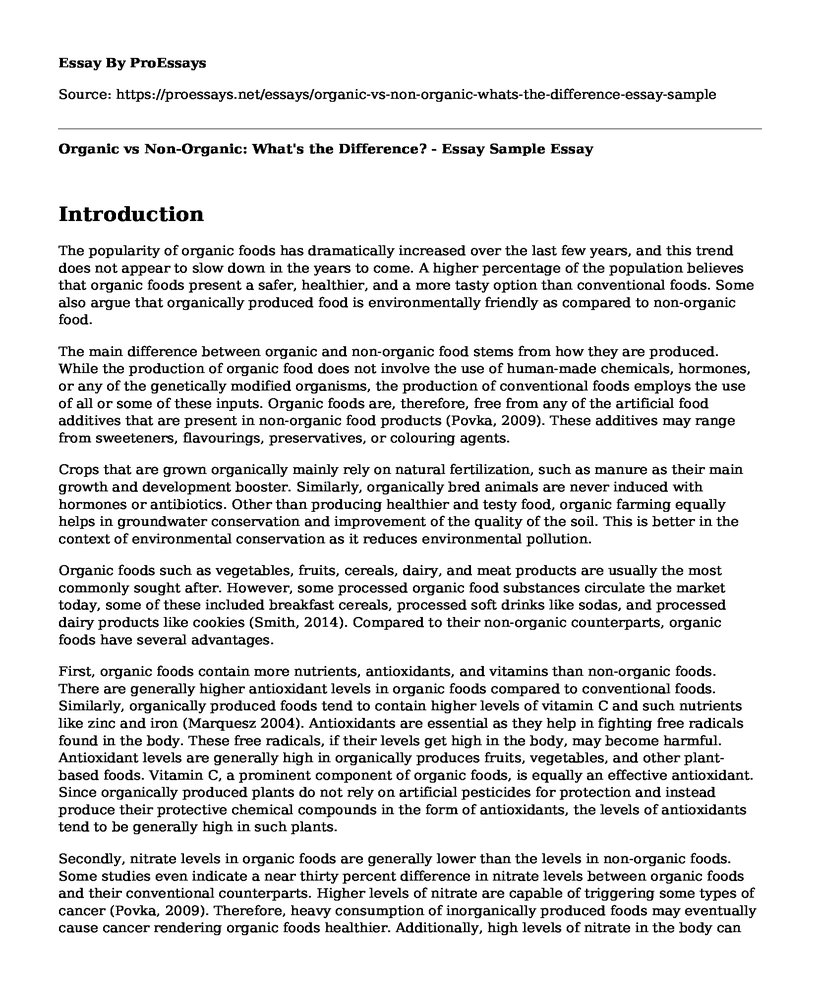Introduction
The popularity of organic foods has dramatically increased over the last few years, and this trend does not appear to slow down in the years to come. A higher percentage of the population believes that organic foods present a safer, healthier, and a more tasty option than conventional foods. Some also argue that organically produced food is environmentally friendly as compared to non-organic food.
The main difference between organic and non-organic food stems from how they are produced. While the production of organic food does not involve the use of human-made chemicals, hormones, or any of the genetically modified organisms, the production of conventional foods employs the use of all or some of these inputs. Organic foods are, therefore, free from any of the artificial food additives that are present in non-organic food products (Povka, 2009). These additives may range from sweeteners, flavourings, preservatives, or colouring agents.
Crops that are grown organically mainly rely on natural fertilization, such as manure as their main growth and development booster. Similarly, organically bred animals are never induced with hormones or antibiotics. Other than producing healthier and testy food, organic farming equally helps in groundwater conservation and improvement of the quality of the soil. This is better in the context of environmental conservation as it reduces environmental pollution.
Organic foods such as vegetables, fruits, cereals, dairy, and meat products are usually the most commonly sought after. However, some processed organic food substances circulate the market today, some of these included breakfast cereals, processed soft drinks like sodas, and processed dairy products like cookies (Smith, 2014). Compared to their non-organic counterparts, organic foods have several advantages.
First, organic foods contain more nutrients, antioxidants, and vitamins than non-organic foods. There are generally higher antioxidant levels in organic foods compared to conventional foods. Similarly, organically produced foods tend to contain higher levels of vitamin C and such nutrients like zinc and iron (Marquesz 2004). Antioxidants are essential as they help in fighting free radicals found in the body. These free radicals, if their levels get high in the body, may become harmful. Antioxidant levels are generally high in organically produces fruits, vegetables, and other plant-based foods. Vitamin C, a prominent component of organic foods, is equally an effective antioxidant. Since organically produced plants do not rely on artificial pesticides for protection and instead produce their protective chemical compounds in the form of antioxidants, the levels of antioxidants tend to be generally high in such plants.
Secondly, nitrate levels in organic foods are generally lower than the levels in non-organic foods. Some studies even indicate a near thirty percent difference in nitrate levels between organic foods and their conventional counterparts. Higher levels of nitrate are capable of triggering some types of cancer (Povka, 2009). Therefore, heavy consumption of inorganically produced foods may eventually cause cancer rendering organic foods healthier. Additionally, high levels of nitrate in the body can also cause methemoglobinemia, a condition that lowers the ability of the body to carry oxygen in infants. This provides another reason to avoid the heavy intake of non-organic foods.
Besides, organic dairy products and milk tend to contain high percentages of omega-three fatty acids and higher iron and vitamin E amounts. Similarly, organic meat tends to contain higher omega-three fatty acid levels and lower saturated fats levels when compared to inorganically produced meat (Smith, 2014). Intake of higher levels of omega-3 fatty acids is linked to several human health benefits, including but not limited to a substantially lowered risk of suffering heart disease.
Finally, organic agriculture greatly benefits the environment and to an extension, human health. The resulting contamination from chemical agriculture usually presents a public health risk Marquez, 2004). Since this method of agricultural production does not employ the use of artificial fertilizers, pesticides, or herbicides that are toxic to the soil and human body, the level of pollution caused to the soil, underground water, and humans is greatly minimized. While chemicals such as pesticides and herbicides are meant to protect the crops, they end up killing vital insects such as bees and butterflies and birds, which act as pollinators, thereby lowering crop yield in the end.
Chemical residues resulting from inorganic agriculture are highly prevalent in the environments hence increasing the risk of human exposure to the adverse effects of these chemicals. Some of the effects on human health include alteration of fatal development, impairment of immune function, and triggering health complications such as cancer (Marquez, 2004). Organic agriculture and the consumption of organic foods provide a safe way out of this predicament. Organic farming limits the addition of chemical fertilizers and the use of chemical sprays, thereby preventing environmental pollution and securing human health.
Conclusion
In conclusion, non-organic foods equally play a vital role in ensuring food security. They also contain some very essential nutrients which may not be found in organic foods. However, conventional foods should only be produced and consumed, where the production and consumption of organic food are not possible. Otherwise, organic food presents a healthier and safer option.
Works Cited
Smith, Melissa Diane. "Non-GMO vs. Organic." Better Nutrition, vol. 76, no. 3, Mar. 2014, pp. 70-72. EBSCOhost, search.ebscohost.com/login.aspx?direct=true&AuthType=ip,shib&db=hxh&AN=94690278&site=ehost-live.
Pavka, Elizabeth. "Organic vs. Conventional." New Life Journal: Carolina Edition, vol. 10, no. 1, Feb. 2009, pp. 18-19. EBSCOhost, search.ebscohost.com/login.aspx?direct=true&AuthType=ip,shib&db=hxh&AN=36315609&site=ehost-live
Marquez, Theresa. "Organic Choices Clarified." New Life Journal: Carolina Edition, vol. 6, no. 2, Oct. 2004, pp. 12-43. EBSCOhost, search.ebscohost.com/login.aspx?direct=true&AuthType=ip,shib&db=hxh&AN=15277303&site=ehost-live.
Cite this page
Organic vs Non-Organic: What's the Difference? - Essay Sample. (2023, May 23). Retrieved from https://proessays.net/essays/organic-vs-non-organic-whats-the-difference-essay-sample
If you are the original author of this essay and no longer wish to have it published on the ProEssays website, please click below to request its removal:
- My Dietary Assessment
- Assignments on Eating Habits
- Essay Sample on The History of McDonald's
- Dr. Sebi: Naturalist, Herbalist, Pathologist, & Biochemist - Research Paper
- Creating a Personalized Diet Plan and Physical Activity Routine - Essay Sample
- Goal - Essay Example
- Production and Cost Analysis in the Fast Food Industry Paper







